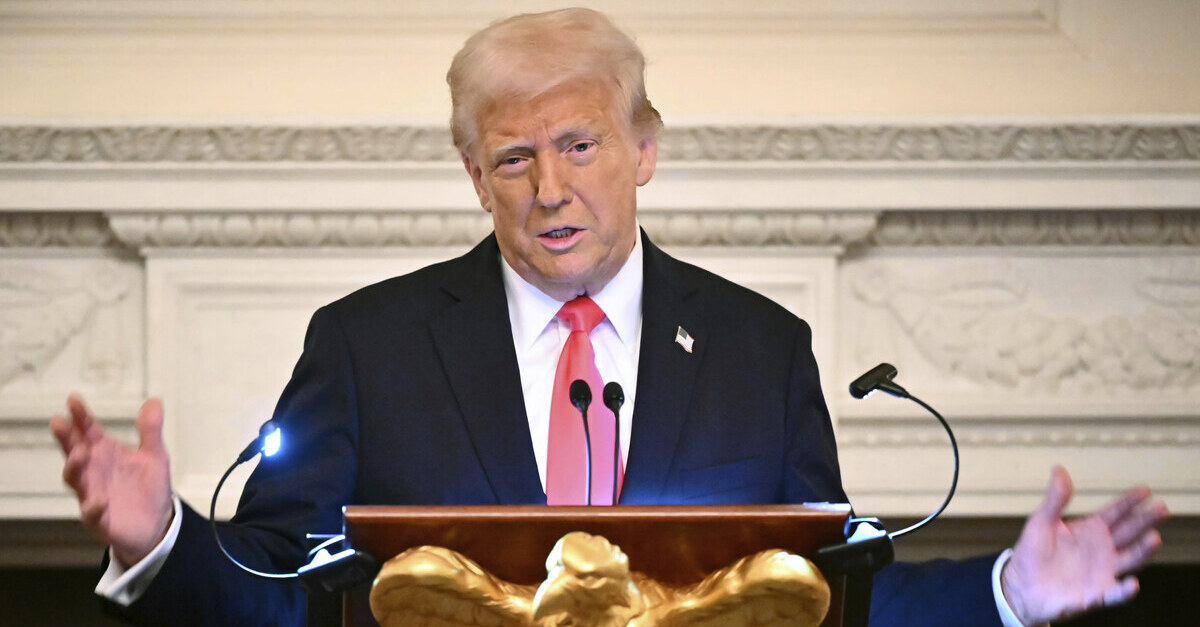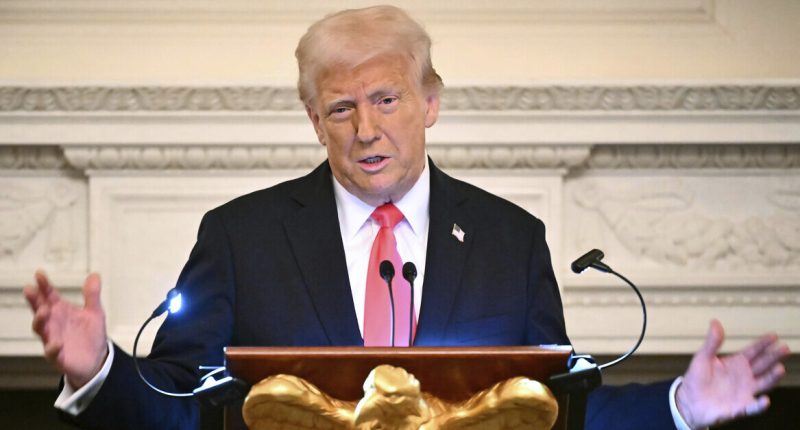Share this @internewscast.com

President Donald Trump gestures while delivering remarks during an Iftar dinner at the White House State Dining Room in Washington, Thursday, March 27, 2025. (Pool via AP).
Another law firm has responded to the Trump administration‘s attacks against it by filing a First Amendment lawsuit in federal court.
President Donald Trump, on Tuesday, signed an Executive Order titled “Addressing Risks from Jenner & Block,” which claims that the national law firm Jenner & Block LLP, based in Chicago, has “forsaken the profession’s highest ideals, supported partisan ‘lawfare,’ and misused its pro bono work to engage in actions that undermine justice and the interests of the United States.”
This order aligns with a series of similar efforts to limit the influence and involvement of major law firms in the federal government—particularly those firms with lawyers who have represented clients viewed by the Trump administration as “harmful to key American interests.”
The 64-page complaint filed Friday in federal court in Washington, D.C., calls the 45th and 47th president’s order “an unconstitutional abuse of power against lawyers, their clients, and the legal system.”
“It is intended to hamper the ability of individuals and businesses to have the lawyers of their choice zealously represent them,” the lawsuit reads. “And it is intended to coerce law firms and lawyers into renouncing the Administration’s critics and ceasing certain representations adverse to the government.”
The original petition takes note of several other “materially identical executive orders” targeting disfavored law firms and, in decidedly strategic fashion, points out that one such order “has already been enjoined by a court in this District” — a reference to U.S. District Judge Beryl Howell recently pumping the brakes on a substantially similar executive order targeting Perkins Coie LLP.
Pressing this potential advantage, Jenner & Block filed a subsequent notice of related case — which might very well work to put the lawsuit before Howell due to the similar nature of the underlying facts.
In that case, Howell granted a temporary restraining order on the basis that Perkins Coie was likely to show Trump’s order violated the First and Fifth Amendments and was clearly “retaliatory” in nature.
On the merits, Jenner & Bock argue in much the same fashion.
“The Order violates the First Amendment by targeting Jenner for its protected speech; by discriminating based on viewpoint; by seeking to prevent Jenner from petitioning the government on behalf of itself and its clients, and by leveraging government controls to suppress protected speech and association,” the lawsuit continues. “The Order violates the Due Process Clause of the Fifth Amendment by impairing the ability of Jenner and its attorneys to practice law; by creating a list of disfavored firms that is anathema to our scheme of ordered liberty; and by creating a vague set of prohibitions that invite arbitrary enforcement.”
One specific grievance cited in the order is how the law firm rehired Andrew Weissmann — the onetime top lieutenant to special counsel Robert Mueller during the Russiagate investigations who would go on to become a trenchant Trump critic in the media. Trump accuses Weissmann of being “unethical,” dishonest, and of having built a career “rooted in weaponized government and abuse of power.”
The lawsuit dings Trump’s order for getting the facts wrong.
“The Order repeatedly references Andrew Weissmann, who has not been employed by Jenner since 2021,” the complaint reads. “Section 5 also purports to limit Weissmann’s access to federal buildings and eligibility for federal employment, apparently on the mistaken belief that Weissmann is a current employee of Jenner.”
Beyond mere inaccuracy, Jenner & Bock say the order “is based principally on the false premise” Weissmann still works for them.
When introducing the Order for the President’s signature, the President clarified that “Andrew Weissmann is the main culprit.” When an aide asserted that Weissmann is just “one of a number of reasons” the order was being issued, the President reiterated that he’s a “bad guy” before signing the Order
“Mr. Weissmann has not performed legal work for Jenner & Block since his departure on July 16, 2021,” the lawsuit goes on. “All payments associated with his time at Jenner have been completed. The Firm has no current financial obligations to Mr. Weissmann. The purported security concerns based on Mr. Weissmann’s association with Jenner & Block cannot justify the Order.”
Aside from First Amendment and Fifth Amendment claims, the lawsuit alleges Sixth Amendment violations “by impairing the Firm’s ability to represent its clients in connection with government-facing work, including criminal matters, and by undermining the attorney-client relationship and clients’ right to counsel of their choice.”
In more fundamental terms, the 13-count lawsuit relies on a theory that Trump simply does not have the ability to instruct the federal government to do what the order purports to do.
“Indeed, the Order is entirely ultra vires,” the lawsuit argues. “It goes beyond the President’s constitutional power, is authorized by no statute, and unlawfully seeks to adjudicate putative wrongdoing by the Firm without process of law.”
The filing seeks declaratory judgments that the order is broadly unconstitutional as well as an immediate restraining order, a preliminary injunction, and a permanent injunction.
Love true crime? Sign up for our newsletter, The Law&Crime Docket, to get the latest real-life crime stories delivered right to your inbox.
In something not entirely unlike a momentum-building pile-on, the law firm of Wilmer Cutler Pickering Hale and Dorr LLP, which is popularly stylized as WilmerHale, also sued the Trump administration on Friday.
The latest Big Law pushback is in response to yet another executive order that aims to cut WilmerHale out of the federal government over alleged slights against “American interests” and “American principles.”
In an 11-count, 63-page lawsuit also filed in Washington, D.C., WilmerHale terms Trump’s law firm-targeting orders “an unprecedented assault on [the] bedrock principle” established by Founding Father John Adams that “one should not be penalized for merely defending or prosecuting a lawsuit.”

















